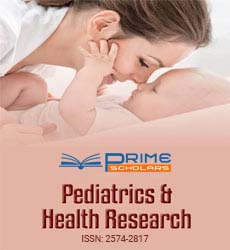Commentary - (2023) Volume 8, Issue 3
Understanding Common Infant Health Problems
Danil Swear*
Department of Science, University of California, USA
*Correspondence:
Danil Swear,
Department of Science, University of California,
USA,
Email:
Received: 30-Aug-2023, Manuscript No. IPPHR-23-17995;
Editor assigned: 01-Sep-2023, Pre QC No. IPPHR-23-17995 (PQ);
Reviewed: 15-Sep-2023, QC No. IPPHR-23-17995;
Revised: 20-Sep-2023, Manuscript No. IPPHR-23-17995 (R);
Published:
27-Sep-2023, DOI: 10.36648/2574-2817-8.3.25
Description
The birth of a baby is an exciting and joyous event, but it also
comes with a profound responsibility for the well-being of the
newborn. Infant health problems can be a source of concern
for parents, but it’s essential to remember that many of these
issues are common and often manageable with appropriate
care and medical attention. This article will explore some of the
most frequent infant health problems, their causes, symptoms,
and potential treatment options. Jaundice is one of the most
common health problems in newborns. It occurs when there is
an excess of bilirubin in the blood, leading to a yellowing of the
skin and eyes. Jaundice is typically benign and often resolves
on its own within the first few weeks of life. In some cases, phototherapy
may be necessary to help the baby’s body process
bilirubin more effectively.
Colic is a term used to describe excessive crying and fussiness in
infants, typically occurring in the late afternoon or evening. The
exact cause of colic remains uncertain, but it can be a source
of significant distress for both babies and their parents. While
colic typically resolves by three to four months of age, parents
can try various soothing techniques, such as gentle rocking,
white noise, or offering a pacifier, to comfort their infant
during colic episodes. Gastroesophageal reflux disease (GERD)
can affect some infants, causing them to spit up or vomit frequently.
This occurs when the stomach contents flow back into
the esophagus. Common symptoms of infant reflux include
fussiness during or after feeds, arching of the back, and poor
weight gain. In mild cases, lifestyle changes and positioning
the baby upright after feeding can help manage symptoms. In
more severe cases, medication may be prescribed. Newborns
are susceptible to respiratory infections, such as the common
cold or bronchiolitis, which can lead to coughing, congestion,
and difficulty breathing. These infections are often caused by
viruses, making antibiotics ineffective. To manage respiratory
infections, it’s essential to ensure the baby stays well-hydrated,
use a humidifier in their room, and seek medical attention if
symptoms worsen or breathing difficulties arise. Diaper rash is
a common problem in infants and is typically caused by prolonged
exposure to wet or soiled diapers, friction, and the sensitive
nature of an infant’s skin. Keeping the diaper area clean
and dry, using a diaper cream or ointment, and allowing the
baby to have some diaper-free time can help prevent and manage
diaper rash. Thrush is a fungal infection that can affect a
baby’s mouth or diaper area. It presents as white patches in
the mouth and can cause discomfort while feeding. Thrush
is usually treated with antifungal medication prescribed by a
healthcare provider. Ear infections can be painful for infants,
causing irritability, fever, and tugging at the ears. They often
follow colds or respiratory infections. Treatment typically involves
antibiotics, but consulting a pediatrician is crucial to
ensure the appropriate course of action. Acne can develop
in children and teenagers, resulting from hormonal changes.
It often manifests as pimples, blackheads, and whiteheads. A
gentle skincare routine and, in some cases, topical treatments
prescribed by a dermatologist can help manage acne. Children
can develop allergic reactions to various substances, including
foods, insect stings, and plants. These reactions can manifest
as hives, redness, itching, and swelling.
Acknowledgement
None.
Conflict Of Interest
None.
Citation: Swear D (2023) Understanding Common Infant Health Problems. Pediatr Heal Res. 8:25.
Copyright: © 2023 Swear D. This is an open-access article distributed under the terms of the Creative Commons Attribution
License, which permits unrestricted use, distribution, and reproduction in any medium, provided the original author and source
are credited.
